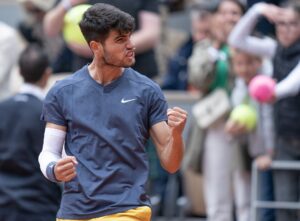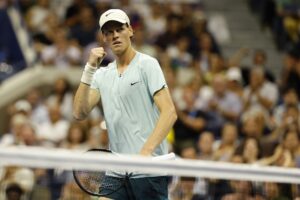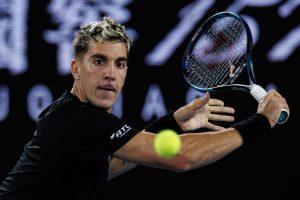Perhaps the reason Daniil Medvedev hates playing on clay is that it adds one more moving part to a game and style of play that is already full of moving parts. It is always almost miraculous that the 6’6″ Muscovite somehow manages to maneuver all his gangly limbs sufficiently to play tennis at all, let alone so brilliantly. However, doing so on a surface that itself often moves (certainly far more so than the hard courts that he prefers) has often proved immensely problematic. Perhaps, though, “Ichabod Cranium” (the nickname that is a testament both to his gigantic frame and enormous tennis intelligence) is finally ready to set aside his doubts about playing on the red dirt.
The Rise of Daniil Medvedev
Prior to this year, Medvedev’s record at the French Open has been so poor that it is almost another tennis miracle that he is somehow seeded second for this year’s tournament. On the one hand, that is a source of frustration for many tennis fans, as it means that the perfect Paris Men’s final between Rafael Nadal and Novak Djokovic (notwithstanding their 2020 damp squib, which Nadal easily won) is not possible in 2021. However, it is also a testament to the fact that over the past two years or so–the period roughly covering the last six months of the regular tour before the pandemic, the long pandemic-caused cessation of the tour, and its resumption in August last year–Medvedev has arguably been the one man outside Nadal and Djokovic who has performed to a consistently supremely high level.
That run really began in the summer of 2019 on the North American hard court swing, when Medvedev reached six finals in succession, culminating in his debut appearance in a Grand Slam final against Rafael Nadal in the US Open. And although he lost that final, it showed that he is both a great competitor and capable of radically changing his style of play if need be, as he effectively switched to a serve-and-volley style after going two sets down to Nadal to come roaring back into contention, before finally succumbing in the fifth set to the great Spaniard.
The pandemic halted Medvedev’s remarkable climb up the rankings, as it did so much else. However, towards the end of 2020 there were signs that he was rediscovering his spectacular form of 2019, particularly when he defeated Dominic Thiem in the ATP Tour Finals to win the season-ending tournament. And he brilliantly maintained that momentum at the start of 2020, as he first spearheaded Russia to victory in the ATP Cup before going all the way to another Major final when he reached the Australian Open final in Melbourne.
However, despite having gone into that final against Novak Djokovic in the most thrilling form imaginable, Medvedev played terribly poorly and succumbed meekly in straight sets. Arguably, he has not recovered from the hangover inflicted by such a crushing defeat, one that had appeared unthinkable before the Melbourne final, and he has certainly not been at his best on the European clay swing leading up to the French Open. His natural reservations about the surface were evident as he played poorly in Madrid and Rome, losing early in both tournaments, and essentially he came into Roland Garros with zero form and confidence on a clay court.
Medvedev at the 2021 French Open
Consequently, it has been impressive that he has at least won two matches at Roland Garros, having never won a single match there before 2021. In particular, his first round match against Alexander Bublik, the Russian-born Kazakh who has huge natural ability if not yet the results to prove it, had “upset” written all over it. Nevertheless, Medvedev triumphed in straight sets, 6-3 6-3 7-5, without playing anywhere near his stellar best. That set himself up nicely for his second round clash with another potentially dangerous “blocker” (someone who cannot win a tournament but can stop others winning it), the U.S.A.’s Tommy Paul.
When Paul took the first set 6-3, there seemed every chance that Medvedev’s traditional dread of the red dirt would return to haunt him. However, as if upset with himself for playing so poorly, he raised his game considerably in the second set to win it easily, 6-1. Nevertheless, when an exchange of breaks of serve left the third set perfectly poised at 3-3, there seemed every chance that the match would go all the way to five sets, which, even if Medvedev had ultimately won, would have taken a significant toll on his energy ahead of what would undoubtedly be tougher matches to come.
Fortunately for Medvedev, four sets were sufficient for him to beat Paul, the laid-back American who many tennis writers and commentators fear may be just too laid-back for his own good. Without ever getting anywhere near the kind of stunning–indeed, almost unbelievable–shot-making form that had taken him to the finals in New York and Melbourne, Medvedev played well enough to eventually win 3-6 6-1 6-4 6-3.
However, even that fourth and final set showed just how Bambi-like the tall Russian can still be on clay. First, he soared into a 4-0 lead that looked like it would lead to a claygel (a bagel on clay), before he lost his serve twice, once while serving for the match, to eventually limp over the line. If his serve is as fragile against the even taller Riley Opelka, who is an NBA-worthy 6’11”, in the third round, then he has every chance of losing. That is especially true because Opelka, who has usually struggled on clay himself, recently reached the last four in Rome before losing to Nadal, and so comes to Paris in good form.
If, however, Medvedev can serve as he usually does (i.e. extremely well), then he has every chance of beating Opelka. Then he would play either Chile’s Cristian Garin or the U.S.A.’s Marcos Giron (who face each other in a match that must be a tennis commentator’s worst nightmare) in the fourth round, either of whom he would be strongly favored to beat.
The suspicion remains, though, that despite Medvedev’s improvements at Roland Garros this year, he is extraordinarily unlikely to win the French Open in 2021, or even seriously challenge for it. If both men win their intervening matches, Medvedev is due to play Stefanos Tsitsipas in the quarterfinal, and given the Greek’s exceptional form on clay this year, which has been second only to that of Nadal himself, it is hard to see anything other than a Tsitsipas victory.
Nevertheless, given his previous travails in the French capital, if Daniil Medvedev could even reach the last eight, that would represent a huge upturn in his Paris form. While he remains unlikely ever to feel completely at ease on clay, a good French Open performance this year could provide the platform for further improvements in the years to come, when he may finally be able to translate his outstanding hard court performances into something comparable on clay.
Main Photo:
Embed from Getty Images






